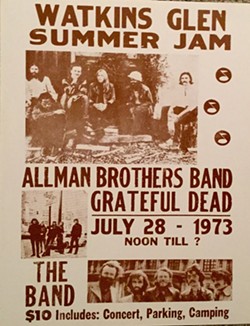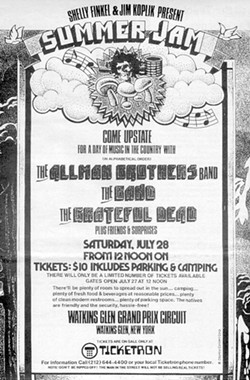Chris Kennedy and three or four of his friends were tucked away in the back of a rental truck, riding from Syracuse to Watkins Glen. He recalls a couple of them alleviating the boredom by firing up joints while they sat on stacks of combustible paper.
When the truck arrived at Watkins Glen, the outdoor concert site was deserted except for the three bands and their crews, running through rehearsals for the next day’s show. Which promised to be a pretty good one. “Summer Jam,” 12 hours of The Allman Brothers Band, The Grateful Dead, and The Band.
The job for the 18-year-old Kennedy and his friends was simple: As people arrived for the concert, hand out the advertisement-filled pamphlets they had been sitting on.
“To say I didn’t understand how many people would be there would be an understatement,” Kennedy says.
No one seemed to understand how many people would be there. Watkins Glen was a quiet village of a mere 3,000 people, nestled at the bottom of Seneca Lake. But just four years after 400,000 people turned out in Bethel, New York, for three days of Woodstock, it’s generally estimated that 600,000 people flooded into tiny Watkins Glen on July 28, 1973 for one day of Summer Jam: the largest crowd to ever attend an outdoor concert in the United States.
Fifty years later, musicians and music lovers alike are celebrating – or remembering, anyway – Summer Jam. Among the commemorations is “Watkins ROCs” at Lovin’ Cup Bistro & Brews on July 28, featuring Blue Sky Brothers (an Allman tribute band), The Next Waltz (a tribute to The Band) and Eric Carlin’s Half Dead (a Grateful Dead tribute).
Similarly, “Summer Jam ’23: Celebrating 50 Years since Watkins Glen” is set for July 29 at Lincoln Hill Farms in Canandaigua. That one features Friends of The Brothers (an Allman tribute), Terrapin Flyer (a Grateful Dead tribute) and the redundantly named The THE BAND Band (a tribute to The Band).
 These are but two of many events statewide linked to the historic concert. Further afield, at the brand new venue Wonderland Forest in LaFayette (just outside of Syracuse), “Summer Jam 50” will take place July 28 and 29. On both days the headlining band, Dark Star Orchestra – just two days after it plays Rochester’s Innovative Field – will recreate the Grateful Dead’s set list from Watkins Glen 50 years ago. Dark Star Orchestra will be joined by another set of corresponding cohorts: Daniel Donato’s Cosmic Country (the Allman tribute) and The Weight Band (as The Band).
These are but two of many events statewide linked to the historic concert. Further afield, at the brand new venue Wonderland Forest in LaFayette (just outside of Syracuse), “Summer Jam 50” will take place July 28 and 29. On both days the headlining band, Dark Star Orchestra – just two days after it plays Rochester’s Innovative Field – will recreate the Grateful Dead’s set list from Watkins Glen 50 years ago. Dark Star Orchestra will be joined by another set of corresponding cohorts: Daniel Donato’s Cosmic Country (the Allman tribute) and The Weight Band (as The Band).
“It was interesting to see these three kinds of threads come together,” Kennedy says. A synchronicity of unlikely social sets. Bikers who came for the Allmans. Deadheads for the Grateful Dead. Lawyers for The Band.
Kennedy, who now teaches creative writing at Syracuse University, remembers the pamphlet crew sitting on the back of their truck watching drug deals (mostly pot). “There was a lot of haggling going on, or bartering,” he says. “‘If you give me half an ounce of that, I’ll give you five hits of this…’”
From the back of the truck, Kennedy and his friends also watched a skydiver leap from a plane and fire up a flare. Then the skydiver disappeared behind some trees, his chute never properly opening. “It was clear that he had fallen,” Kennedy says. The man died, and when Kennedy later saw a newspaper story on the accident. “I realized who it was,” he says, “I knew him. Some friends of mine had just taken skydiving lessons from him.” 
Few things went according to plan that first year. Kennedy saw Bill Graham, the legendary concert promoter and producer of the show, on horseback at the gate, “clearly perturbed that so many people were coming in without having paid. Eventually they just let everyone in, like Woodstock. They just stopped trying.”
The rain arrived at the end of the day, and the end of the show. Having lost contact with each other in the early hours of the concert, only Kennedy and one other member of their pamphlet crew ever found their way back to the truck. They watched from the vehicle’s open back door as an army of 600,000 concertgoers retreated. Kennedy remembers it being miserable.
“The road was clogged with people, you couldn’t go more than a mile or two an hour,” he says. “The guy who drove the truck was basically freaking out, and ready to drive over people to get out of there.”
Looking back a half-century, Kennedy says Summer Jam was not a great experience in terms of how people dealt with each other.
“A lot of people tried to take advantage of other people’s naivety about drugs and stuff like that. A little disillusioning for an 18-year-old,” he says. “It was an era coming to a close in a lot of ways.”
Jeff Spevak is senior arts writer for WXXI/CITY Magazine. He can be reached at [email protected].
When the truck arrived at Watkins Glen, the outdoor concert site was deserted except for the three bands and their crews, running through rehearsals for the next day’s show. Which promised to be a pretty good one. “Summer Jam,” 12 hours of The Allman Brothers Band, The Grateful Dead, and The Band.
The job for the 18-year-old Kennedy and his friends was simple: As people arrived for the concert, hand out the advertisement-filled pamphlets they had been sitting on.
“To say I didn’t understand how many people would be there would be an understatement,” Kennedy says.
No one seemed to understand how many people would be there. Watkins Glen was a quiet village of a mere 3,000 people, nestled at the bottom of Seneca Lake. But just four years after 400,000 people turned out in Bethel, New York, for three days of Woodstock, it’s generally estimated that 600,000 people flooded into tiny Watkins Glen on July 28, 1973 for one day of Summer Jam: the largest crowd to ever attend an outdoor concert in the United States.
Fifty years later, musicians and music lovers alike are celebrating – or remembering, anyway – Summer Jam. Among the commemorations is “Watkins ROCs” at Lovin’ Cup Bistro & Brews on July 28, featuring Blue Sky Brothers (an Allman tribute band), The Next Waltz (a tribute to The Band) and Eric Carlin’s Half Dead (a Grateful Dead tribute).
Similarly, “Summer Jam ’23: Celebrating 50 Years since Watkins Glen” is set for July 29 at Lincoln Hill Farms in Canandaigua. That one features Friends of The Brothers (an Allman tribute), Terrapin Flyer (a Grateful Dead tribute) and the redundantly named The THE BAND Band (a tribute to The Band).

“It was interesting to see these three kinds of threads come together,” Kennedy says. A synchronicity of unlikely social sets. Bikers who came for the Allmans. Deadheads for the Grateful Dead. Lawyers for The Band.
Kennedy, who now teaches creative writing at Syracuse University, remembers the pamphlet crew sitting on the back of their truck watching drug deals (mostly pot). “There was a lot of haggling going on, or bartering,” he says. “‘If you give me half an ounce of that, I’ll give you five hits of this…’”
From the back of the truck, Kennedy and his friends also watched a skydiver leap from a plane and fire up a flare. Then the skydiver disappeared behind some trees, his chute never properly opening. “It was clear that he had fallen,” Kennedy says. The man died, and when Kennedy later saw a newspaper story on the accident. “I realized who it was,” he says, “I knew him. Some friends of mine had just taken skydiving lessons from him.”

Few things went according to plan that first year. Kennedy saw Bill Graham, the legendary concert promoter and producer of the show, on horseback at the gate, “clearly perturbed that so many people were coming in without having paid. Eventually they just let everyone in, like Woodstock. They just stopped trying.”
The rain arrived at the end of the day, and the end of the show. Having lost contact with each other in the early hours of the concert, only Kennedy and one other member of their pamphlet crew ever found their way back to the truck. They watched from the vehicle’s open back door as an army of 600,000 concertgoers retreated. Kennedy remembers it being miserable.
“The road was clogged with people, you couldn’t go more than a mile or two an hour,” he says. “The guy who drove the truck was basically freaking out, and ready to drive over people to get out of there.”
Looking back a half-century, Kennedy says Summer Jam was not a great experience in terms of how people dealt with each other.
“A lot of people tried to take advantage of other people’s naivety about drugs and stuff like that. A little disillusioning for an 18-year-old,” he says. “It was an era coming to a close in a lot of ways.”
Jeff Spevak is senior arts writer for WXXI/CITY Magazine. He can be reached at [email protected].

